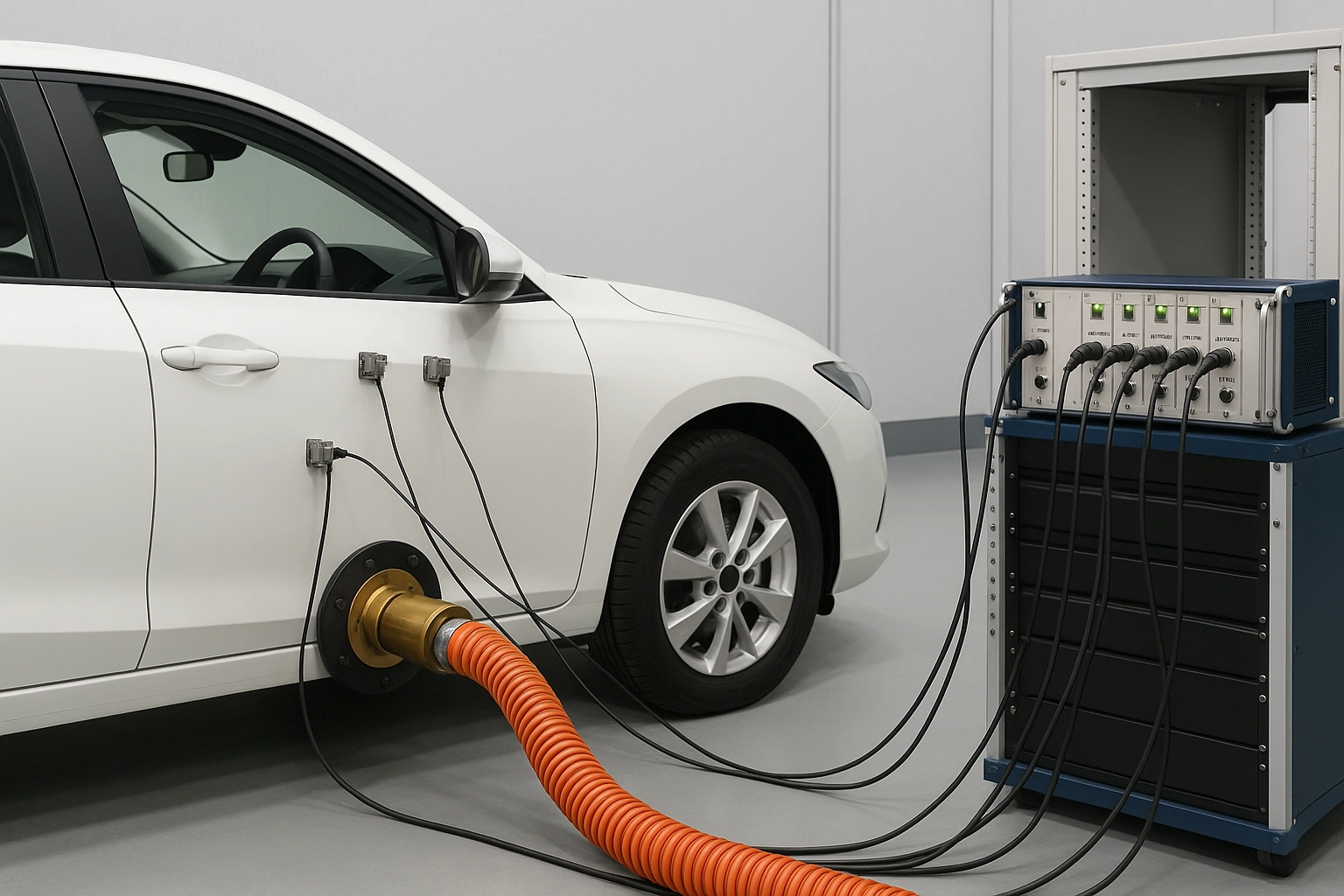JIS D0207 Glass Acoustic NVH Testing
The JIS D0207 standard is a critical benchmark in the automotive industry, particularly for noise, vibration and harshness (NVH) testing of glass. This test method evaluates the acoustic properties of safety glazing materials used in vehicles to ensure they meet specific performance requirements set by Japan's Industrial Standards Committee.
The JIS D0207 standard is designed to assess the sound insulation capabilities of automotive window glass, windshield, and sunroof components. It measures the reduction of noise transmitted from a source (such as road or engine noise) through the glass specimen under controlled environmental conditions. The test aims to provide data that ensures vehicle occupants experience minimal intrusion from external sounds while maintaining a high level of safety.
The testing procedure involves placing the glass sample between two chambers: one chamber where sound is generated, and another where the sound transmission is measured. A calibrated noise source produces a wideband noise signal through an air-coupled transducer placed on the specimen's surface. The transmitted sound is then captured by a receiving transducer located in the other chamber.
The test setup includes high-quality acoustic measurement equipment capable of capturing precise sound pressure levels at various frequencies. This instrumentation ensures accurate and reproducible data, which is crucial for compliance with JIS D0207 requirements. Testing typically follows a set protocol that includes:
- Specimen preparation: Ensuring the glass sample fits the specified dimensions and has no defects.
- Environmental control: Maintaining stable temperature and humidity conditions to prevent measurement inaccuracies.
- Data acquisition: Recording sound pressure levels at multiple points along the specimen's surface.
The results are analyzed against predefined thresholds, which vary based on the type of glass being tested (e.g., front windshield or side window). Compliance with JIS D0207 ensures that automotive manufacturers can produce vehicles with enhanced NVH performance, leading to a quieter and more comfortable driving experience for passengers.
Compliance with this standard is not only beneficial for enhancing the customer satisfaction of end-users but also essential for regulatory compliance. Many countries around the world have adopted similar standards or use JIS D0207 as a reference when developing their own automotive safety guidelines. As such, manufacturers who adhere to these standards are better positioned in the global market.
Why It Matters
The importance of NVH testing cannot be overstated, especially within the context of glass materials used in vehicles. Noise, vibration, and harshness contribute significantly to a vehicle's overall quality perception by passengers. High levels of noise or unpleasant vibrations can detract from the driving experience, leading to decreased customer satisfaction and higher rates of product returns.
Compliance with standards like JIS D0207 is crucial for several reasons:
- Enhanced Safety: Properly tested glass ensures that it meets safety requirements while also providing good acoustic insulation. This reduces the risk of accidents caused by external noises or vibrations.
- Better Customer Experience: Quieter interiors contribute to a more pleasant driving environment, which is highly valued by consumers.
- Regulatory Compliance: Many countries require vehicles to meet specific NVH performance standards. Compliance helps avoid potential fines and legal issues.
- Competitive Advantage: Brands that consistently meet or exceed these standards can differentiate themselves in the market, attracting customers who prioritize quality and safety.
In summary, JIS D0207 testing is a vital component of ensuring automotive glass meets both functional and regulatory requirements. By adhering to this standard, manufacturers can improve vehicle performance, enhance customer satisfaction, and maintain a competitive edge in the global market.
Benefits
The benefits of JIS D0207 glass acoustic NVH testing extend beyond mere compliance; they contribute significantly to the overall quality and safety of automotive products. Here are some key advantages:
- Improved Acoustic Performance: Testing ensures that the glass effectively insulates against noise, providing a quieter interior environment.
- Enhanced Safety: By meeting stringent acoustic requirements, the glass helps minimize distractions caused by external sounds, contributing to safer driving conditions.
- Predictable Results: The standard provides clear guidelines for testing procedures and acceptance criteria, ensuring consistent and reliable outcomes.
- Cost Efficiency: Early identification of issues during development can prevent costly reworks later in the production cycle.
- Innovation Support: Compliance with global standards encourages innovation by setting a high bar for performance expectations.
- Risk Management: Meeting these standards helps mitigate risks associated with non-compliance, such as recalls and legal actions.
- Market Access: Adhering to international standards like JIS D0207 opens doors to global markets where similar requirements are in place.
In conclusion, investing in JIS D0207 testing is an investment in product quality and customer satisfaction. It ensures that automotive manufacturers can deliver products that not only meet but exceed industry expectations.
Use Cases and Application Examples
| Use Case | Description |
|---|---|
| Front Windshield Testing | This test evaluates the acoustic performance of a vehicle's front windshield, ensuring it meets JIS D0207 requirements for sound insulation and structural integrity. |
| Side Window Glass Testing | The side windows are tested to ensure they provide adequate noise reduction while maintaining safety standards. |
| Sunroof Acoustic Properties | This test assesses the acoustic properties of sunroofs, ensuring they contribute positively to NVH performance without compromising safety or structural integrity. |
| Vent Glass Testing | The ventilation glass in vehicles is tested for its sound insulation capabilities and structural stability. |
| Door Glass Acoustic Performance | This test ensures that the door windows meet JIS D0207 standards, contributing to overall vehicle NVH performance. |
| Interior Trim Testing | The acoustic properties of interior trim materials are tested for their contribution to overall NVH performance within vehicles. |
| Automotive Glazing Systems | This broader test encompasses the entire glazing system, ensuring that all components work together effectively and meet JIS D0207 requirements. |
In these scenarios, rigorous testing ensures that each component of the vehicle contributes to a harmonious interior environment. The data obtained from JIS D0207 testing is invaluable for R&D teams in refining designs and materials used in automotive glazing systems.





